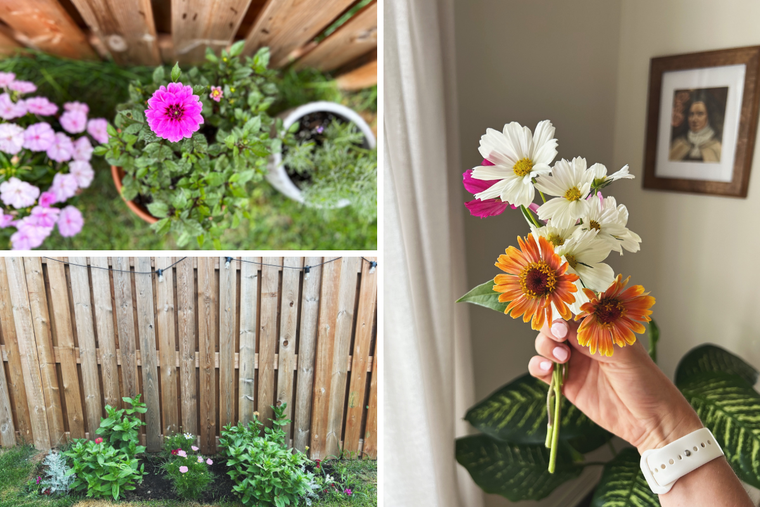Bloom and Grow: Prayerful Lessons for the Change of Seasons
I’ve noticed how this rhythm of the seasons and the habits built upon them can deeply inform my spiritual life.

Memories of northern Ohio summers at home are vivid in my mind. Throughout these warm months, my mom carefully tended a beautiful garden at our home, and I loved being her little sidekick, taking mental notes as I watched each intentional step. As August turned to September, she gave a little extra attention to her garden beds, being sure to rescue anything that might be kept through the winter. She would harvest what she could and simply savor the rest until the first frost.
I watched my mom employ many practices: cutting flowers for vases while they still bloomed (and always relishing the joy they’d bring all week), saving seeds, drying herbs, picking vegetables to chop and freeze or can. Even though the sun was still high, she was preparing for the months ahead.
As I’ve grown up and learned to practice some of these rituals on my own, I’ve noticed how this rhythm of the seasons and the habits built upon them can deeply inform my spiritual life.
This year, as the days begin to shorten, I’ve started thinking about what to save, what to savor, and what I’ve learned through the process — in both my garden and in my heart.
A Daily Examen
Every morning, I walk right outside to my tiny garden. Usually barefooted, I survey each plant to see how it’s faring. I notice new buds and blooms and look for struggling leaves and beetle bites. I scan for changes, growth, new life and death. I snip the fully formed blossoms and bring them inside to arrange in a vase. I pull off dead leaves and rub fresh herbs between my fingers to smell their lovely aroma.
This is a daily examen of my garden. I mimic the routine in prayer. Asking questions to myself and my Lord, I look for areas of life and death, virtue and sin in my life. I praise him for new blooms, and I entrust to him the areas where I seem to keep failing. I rest in the joys and let their sweetness infuse other areas of my life and hope I will have a chance to share some of them with others.
Storing Up Graces
I remember summer days when my mom spent hours chopping herbs and vegetables to make her famous summer soup that was specifically to be saved for the winter. My mom knew how valuable this intentional preparation would be for our family when the days were long, cold and dark and the garden was hidden by snow. This soup would remind us of warmer days and fuel us until the sun shone brightly again.
On those coldest of days, I would cling to my mom’s offer of a bowl of her soup. She’d step across the kitchen floor, creaking with the cold, and open up the freezer door. Pulling out a batch of soup and emptying the contents into a pot on the stove, our kitchen began to fill with the smells of summer. As the flame licked the pot and thawed the mix, aromas of fresh basil and thyme mingled with sweet tomatoes and bell peppers. In an instant, I was brought back to the warmth of June. Bringing the spoon to my wind-chapped face, I was deeply comforted by the smell and taste of warmer days.
Like my mom, I’ve started practicing this ritual. I chop and dry my herbs; I cut corn off the cob to freeze for soups and stir-fries. I know that colder days are coming, so I enjoy what I have for now and save what I can for later.
Similarly, in prayer, I try to soak in the joys that the Lord is presently offering me. I look for areas of abundance in my life, and I let them sink deeply into my heart; then I write these down in my journal or on a note on my phone. This way, I can return to these little rays of sunshine when the inevitable winter arrives.
Humble Surrender
While I, like my mom, do my best to use and save what I can from the garden, some things will simply not survive. As much as it would please me, I simply won’t have more cut flowers in my house in December by cutting more in July. These blooms are only for a season.

Just as we can harvest and preserve the fruits, of equal importance is knowing what to leave behind. At this time, I ask the Lord: “What in my life needs to be left behind? What has served me but may need to be relinquished now?” Freedom comes from this exercise of surrender: freedom to enjoy what I have today and freedom to release my grasp on anything that cannot come with me.
Just like gardening and the changing of seasons, cultivating a soul for the kingdom of God is slow, patient work. Sunny days make way for blizzards. Sin tempts us from grace and mercy.
As we prepare for a new season, let us do the important work of tending to our hearts and souls, walking with Jesus through the garden in the cool of the evening, learning how to better love and serve in all seasons.
- Keywords:
- liturgical living
- gardening
- flowers

















